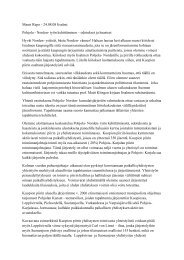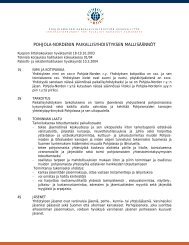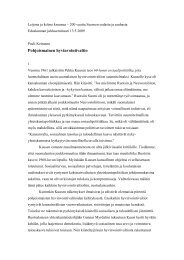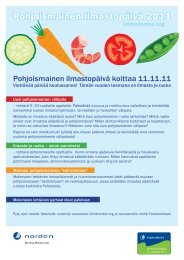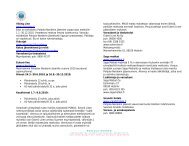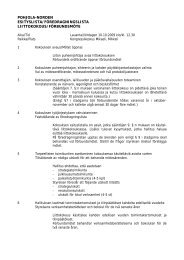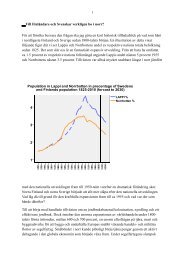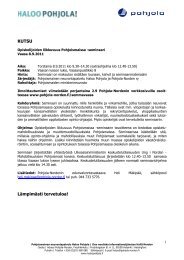The Nordic Model - Embracing globalization and sharing risks
The Nordic Model - Embracing globalization and sharing risks
The Nordic Model - Embracing globalization and sharing risks
Create successful ePaper yourself
Turn your PDF publications into a flip-book with our unique Google optimized e-Paper software.
Adverse selection<br />
problems explain why,<br />
e.g., comprehensive<br />
health insurance cannot<br />
be provided by<br />
competitive markets<br />
Consumers can have<br />
difficulties in making<br />
informed decisions,<br />
<strong>and</strong> the information<br />
required can sometimes<br />
be acquired better<br />
by public agencies<br />
Asymmetric information causes contractual externalities, which<br />
competitive markets often have problems with. A case in point<br />
is the market for health insurance, which suffers from an adverse<br />
selection problem. Adverse selection occurs when people know<br />
their own health <strong>risks</strong> better than the insurance company <strong>and</strong><br />
purchase insurance based on their private information. Insurance<br />
companies would like to know the health <strong>risks</strong>, too, but they may<br />
have to infer the <strong>risks</strong> (imperfectly) from individual purchasing<br />
behavior. Those who want to buy comprehensive coverage are<br />
suspected to have relatively poor health, forcing the price for<br />
comprehensive insurance higher than it would be if insurance were<br />
m<strong>and</strong>atory. As the price of comprehensive coverage rises, even<br />
less healthy will drop out of the pool. <strong>The</strong> process may not end<br />
until everyone, except the very sick, have been discouraged to buy<br />
comprehensive insurance. In that case a competitive market will<br />
be unable to provide full insurance. 4 For this reason, m<strong>and</strong>atory<br />
health insurance is widely regarded as desirable. 5 Even the U.S.<br />
is on the verge of adopting general health insurance, though the<br />
public sector will play a lesser role in the U.S. system.<br />
Public oversight. Market efficiency rests on the assumption that<br />
consumers can make informed decisions. In some cases information<br />
can be more cheaply acquired by an agency than by each<br />
individual separately. <strong>The</strong> safety of products is a case in point.<br />
Firms may be able to certify their products using a private agency,<br />
but given the firms’ bias towards profit, people may not trust their<br />
choice of agency. <strong>The</strong> credibility of the government often beats the<br />
credibility of a private agency. <strong>The</strong> safety of medicines, toys <strong>and</strong><br />
vehicles are illustrative. When consumers can rely on minimum<br />
st<strong>and</strong>ards assured by government, their monitoring costs can be<br />
significantly reduced.<br />
More complex issues arise when services are provided to<br />
people incapable of making decisions. Nursery homes are a topical<br />
example. Family members <strong>and</strong> friends can act as trustees, but they<br />
are not always perfect substitutes for the real consumer: the person<br />
in need of the nursing home. Government provided or subsidized<br />
nursing homes are a possible solution.<br />
Poor quality. Nursing homes, health care <strong>and</strong> primary schools<br />
bring up another potential advantage of public service supply. Profit<br />
<strong>The</strong> proper scope of the public sector · 141





